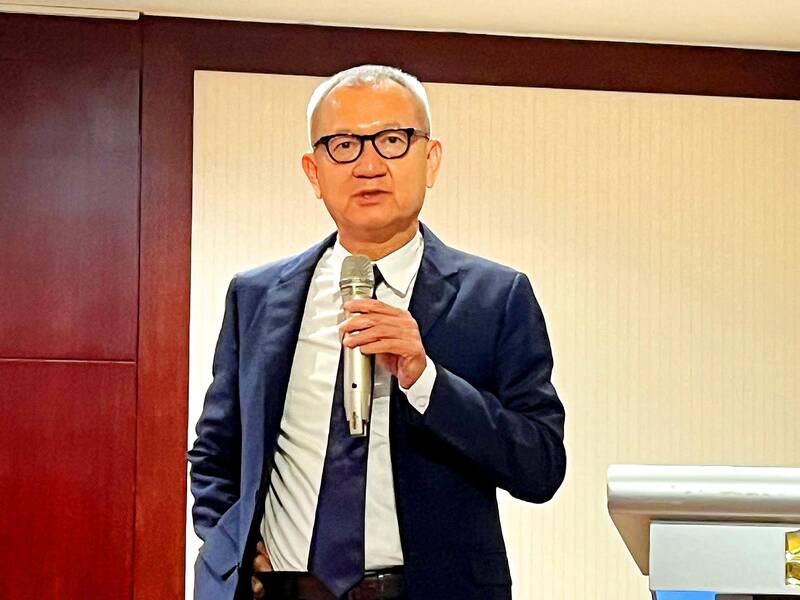Passive components maker Yageo Corp (國巨) yesterday said it expects the acquisition of two European sensor companies to add about NT$13 billion (US$403 million) to its revenue next year, helping the company broaden its product offerings to high-end sensors used in automotive and industrial devices.
The sensor market is a new area for Yageo, the company said.
The new acquisitions would also help the company better shield against industrial downturns and economic headwinds, as its premium products are less volatile than standard passive components used in consumer electronics.

Photo: Chang Hui-wen, Taipei Times
“The acquisitions will accelerate Yageo’s expansions into premium markets such as the automotive segment, allowing the company’s operation to better weather downturns,” Yageo chairman Pierre Chen (陳泰銘) told an investors’ conference in Taipei.
High-end products are to account for 80 percent of the company’s total revenue following the transactions, compared with 75 percent currently, Chen said.
Additionally, Yageo this year could hit its target of boosting automotive-related product revenue to 22 percent, one year earlier than expected, he said.
Chen made the remarks after the company last month unveiled plans to acquire German sensor supplier Heraeus Holding GmbH and France-based Schneider Electric’s Telemecanique sensor business for NT$2.84 billion and NT$12.4 billion respectively.
The firm has a good chance to complete the transactions in the first half of next year, he said.
With higher revenue from premium products, Yageo does not expect to experience the significant drop in gross margin seen by its peers, Chen said, adding that local competitors generated more than 90 percent from standard passive components, and saw gross margin dip to just above 10 percent from 30 percent.
“Companies with high exposure to standard products are going to experience a tough time during the next two years,” he said.
The passive component industry is entering into an inventory-driven downward trend, although excessive inventories in supply chains are expected to level off in the second or third quarter of next year, Chen said.
Yageo has been trying to enter the sensor market since 2015, he added.
The company now has grown into the world’s No. 3 maker of passive components through 20 mergers and acquisitions over the past two decades. Revenue expanded to NT$106.54 billion last year, surging 58 percent from 2020.
Yageo operates 42 factories in 28 countries. About 80 percent of its 45,000 employees are based abroad.

UNCERTAINTY: Innolux activated a stringent supply chain management mechanism, as it did during the COVID-19 pandemic, to ensure optimal inventory levels for customers Flat-panel display makers AUO Corp (友達) and Innolux Corp (群創) yesterday said that about 12 to 20 percent of their display business is at risk of potential US tariffs and that they would relocate production or shipment destinations to mitigate the levies’ effects. US tariffs would have a direct impact of US$200 million on AUO’s revenue, company chairman Paul Peng (彭雙浪) told reporters on the sidelines of the Touch Taiwan trade show in Taipei yesterday. That would make up about 12 percent of the company’s overall revenue. To cope with the tariff uncertainty, AUO plans to allocate its production to manufacturing facilities in

TAKING STOCK: A Taiwanese cookware firm in Vietnam urged customers to assess inventory or place orders early so shipments can reach the US while tariffs are paused Taiwanese businesses in Vietnam are exploring alternatives after the White House imposed a 46 percent import duty on Vietnamese goods, following US President Donald Trump’s announcement of “reciprocal” tariffs on the US’ trading partners. Lo Shih-liang (羅世良), chairman of Brico Industry Co (裕茂工業), a Taiwanese company that manufactures cast iron cookware and stove components in Vietnam, said that more than 40 percent of his business was tied to the US market, describing the constant US policy shifts as an emotional roller coaster. “I work during the day and stay up all night watching the news. I’ve been following US news until 3am

Taiwan will prioritize the development of silicon photonics by taking advantage of its strength in the semiconductor industry to build another shield to protect the local economy, National Development Council (NDC) Minister Paul Liu (劉鏡清) said yesterday. Speaking at a meeting of the legislature’s Economics Committee, Liu said Taiwan already has the artificial intelligence (AI) industry as a shield, after the semiconductor industry, to safeguard the country, and is looking at new unique fields to build more economic shields. While Taiwan will further strengthen its existing shields, over the longer term, the country is determined to focus on such potential segments as

COLLABORATION: Given Taiwan’s key position in global supply chains, the US firm is discussing strategies with local partners and clients to deal with global uncertainties Advanced Micro Devices Inc (AMD) yesterday said it is meeting with local ecosystem partners, including Taiwan Semiconductor Manufacturing Co (TSMC, 台積電), to discuss strategies, including long-term manufacturing, to navigate uncertainties such as US tariffs, as Taiwan occupies an important position in global supply chains. AMD chief executive officer Lisa Su (蘇姿丰) told reporters that Taiwan is an important part of the chip designer’s ecosystem and she is discussing with partners and customers in Taiwan to forge strong collaborations on different areas during this critical period. AMD has just become the first artificial-intelligence (AI) server chip customer of TSMC to utilize its advanced